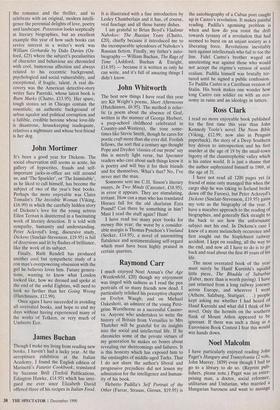Raymond Carr
I much enjoyed Noel Annan's Our Age (Weidenfeld, £20) though my enjoyment was tinged with sadness as I read the pen portraits of so many friends now dead. I particularly relished his perceptive chapter on Evelyn Waugh; and on Michael Oakeshott, an admirer of the young Pere- grine Worsthorne as a successful Casano- va. Anyone who undertakes to write the history of Britain from Versailles to Mrs Thatcher will be grateful for its insights into the social and intellectual life. If he chronicles some of the private virtues of my generation he makes no bones about revealing our shortcomings and failures. It is this honesty which has exposed him to the onslaughts of middle-aged Turks. That I do not share the author's liberal and progressive prejudices did not lessen my admiration for the intelligence and human- ity of his book.
Heberto Padilla's Self Portrait of the Other (Farrar, Strauss, Giroux, $19.95) is the autobiography of a Cuban poet caught up in Castro's revolution. It makes painful reading. Padilla's agonising problem is when and how do you resist the drift towards tyranny of a revolution that had seemed to burst on an unjust society as a liberating force. Revolutions inevitably turn against intellectuals who fail to toe the line. Fidel Castro's brother waged an unrelenting war against those who would not accept the regime's version of social realism. Padilla himself was brutally tor- tured until he signed a public confession. To Padilla Castro is a Carribean version of Stalin. His book makes one wonder how long Castro can soldier on with an eco- nomy in ruins and an ideology in tatters.










































































 Previous page
Previous page